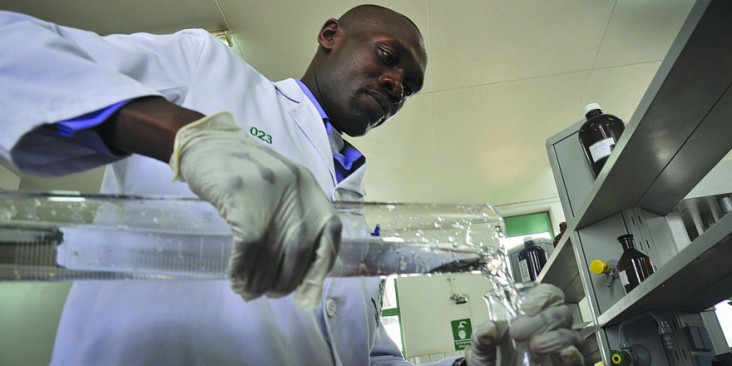- What We Do
- Agriculture and Food Security
- Democracy, Human Rights and Governance
- Economic Growth and Trade
- Education
- Ending Extreme Poverty
- Environment and Global Climate Change
- Gender Equality and Women's Empowerment
- Global Health
- Water and Sanitation
- Working in Crises and Conflict
- U.S. Global Development Lab


Margaret McCluskey, RN, MPH, is the Senior Technical Advisor for HIV Vaccines in the Office of HIV/AIDS (OHA), Bureau for Global Health, USAID

With special guest blogger: Giacomo Gorini*, PhD Candidate in Veterinary Medicine, Laboratory of Viral Zoonotics, Cambridge, U.K., and Visiting Fellow at the National Cancer Institute, National Institutes of Health
Recent Blog Posts
- Partnering with Local Institutions to Strengthen HIV Research Capacity
Aisha Yansaneh - May 1, 2017 - It Takes a Village! Meeting Multiple Health and Development Needs of Girls and Young Women in Sub-Saharan Africa
Nagesh Borse - April 6, 2017
Some people wonder why we commemorate the day that President Clinton called for the development of an HIV vaccine in the next decade – an effort which has been riddled with difficulty. In 1997 he said:
“We are grateful that new and effective anti-HIV strategies are available and bringing longer and better lives to those who are infected, but we dare not be complacent. HIV is capable of mutating and becoming resistant to therapies and could well become even more dangerous. Only a truly effective, preventive HIV vaccine can limit and eventually eliminate the threat of AIDS.”
It begs the questions 20 years later: What progress has been made so far? How close are we to the discovery and rollout of the ultimate tool to end HIV and AIDS? These are fair questions, which drive those of us in the HIV research and development field with a fervent sense of urgency.
HIV Vaccine Awareness Day, May 18, has often been marked by applauding the scientific progress toward an HIV vaccine to date or, more frequently, acknowledging the invaluable participation of clinical trial volunteers – both of which are completely appropriate and meaningful to emphasize. This year, however, I thought it would be particularly forward-thinking to include a young investigator's optimism, vision and enthusiasm for the promise and potential of HIV vaccine discoveries in the future.
At a recent scientific conference, I was having dinner with a small group of senior scientists who have been working on developing an HIV vaccine for these past two decades. We found ourselves discussing the hurdles that still lie ahead of us in this noble effort. It is not lost on any of us that it took more than 40 years to discover the vaccine for polio and that a vaccine to prevent HIV will be the ultimate "game-changer" for the most devastating infectious disease challenge of this generation. Lucky for us, a young and brilliant scientist was in our midst. When he was challenged with the question as to whether or not he could envision himself in this field 20 years from now, his response was bold, optimistic and visionary.
Rather than try to recreate my colleague's response, I invited him as a guest commentator for this year's OHA Research Blog to mark this important anniversary. Here are Giacomo Gorini's sentiments in his own words:
"It was surprising to me to hear the conversation on the progress towards an AIDS vaccine was associated with some shared frustration given that one is still in development and that we still have significant scientific progress to achieve one. While on the one hand I understand their sentiments, on the other, I believe that there's reason to not lose heart. The search for a vaccine to stop HIV continues to attract many young investigators who are willing to join forces in this worthwhile endeavor. As one of those young scientists, I am truly inspired to rise to the challenge and to work even harder to come up with new ideas – to dig deeper and find the answers that I'm sure are there. It may be that some innovative concepts have yet to be explored thoroughly, but I firmly believe that a successful, cost-effective and widely accessible HIV vaccine will be developed as long as our research goes hand-in-hand with the invention and evolution of new technologies, and the voices of those with new ideas are heard and evaluated for proper support. I'm speaking for myself now, but I trust that my generation is eager to take on this challenge and, one day, be up to the task to be handed over the baton and deliver the definitive tool to end HIV once and for all."
As Giacomo suggests, we still have a way to go before a definitive vaccine is in our toolkit to fight HIV. Thank goodness we also have bright, devoted and determined young scientists spending well more than 40 hours a week at their benches trying to solve this puzzle. So, on this 20-year anniversary, let us all be heartened by the efforts of young scientists like Giacomo who are working night and day toward a vaccine to put an end to HIV and AIDS – as he says: Once, and for all.
*The views expressed in this blog are personal and do not necessarily reflect the views of the institutions with which Mr. Gorini is affiliated.







Add new comment